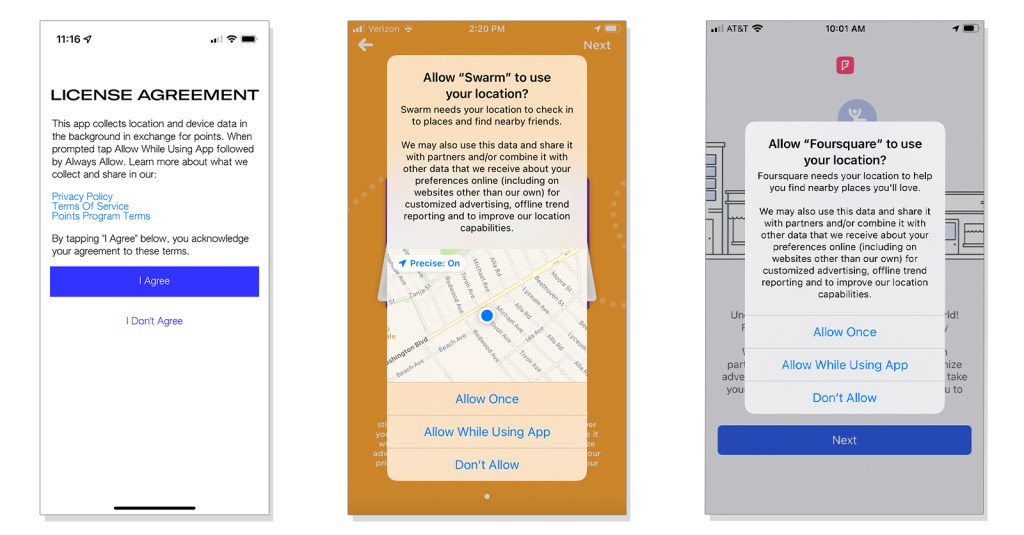Transparency and control serve as the foundation of Foursquare’s approach to protecting consumer privacy. We know that handling consumers’ data is a privilege, and one that we do not take for granted.
Our privacy policies and practices at Foursquare are rooted in consumer control. In addition to ensuring consumers understand that they can choose whether or not to share their data with us, we guarantee all consumers the right to access and delete their data, and to opt out from data sales if they change their mind about our data use at some point in the future.
What kind of consumer data does Foursquare collect, and why does Foursquare need that data?
Ever type in a business name into Uber, or tag your location in a photo before sharing on Twitter? Or, have you ever received a notification for a coupon when you’re passing by your favorite fast food joint? Foursquare powers these features as well as others that help people navigate, explore, and enjoy the world around them.
Foursquare works primarily with two types of location data: point of interest (POI) data, and foot traffic (aka visitation) data. As the name suggests, POI data relates to physical places (restaurants, shops, airports, hotels, etc.). Foot traffic data is data about where mobile devices go. In addition to offering our own consumer apps and location technology to other app developers, Foursquare uses these two types of data to build our industry-leading products that benefit brands, enterprises, and consumers.
Foursquare’s location data can also help keep people safe and healthy. For example, during the height of the COVID-19 pandemic, we partnered with LinkNYC to inform NYC shoppers about the least crowded shopping times at their local grocery stores.
We never sell such GPS data to government entities. This is one reason why Foursquare continues to call for federal privacy legislation that would regulate (or even prevent) such data use and protect consumers.
How does Foursquare collect data?
Foursquare has a few different types of data sources: our owned and operated applications, other apps that use our location tools (when the app developer permits us to use such data and its collected with user consent), and select suppliers, including individual app publishers.
Data we gather from our owned and operated apps (CityGuide, Swarm, and Rewards) as well as the data collected from our partner apps are collected with user-consent and captured using our proprietary tool called Pilgrim SDK. This is a software development kit (essentially a set of software code) that is integrated by app developers to deliver consumers location based experiences. The SDK uses various technologies such as the location services of your operating system or browser, sensor data from your device, as well as other data that may help us understand the exact location of a device.
How does Foursquare give users control over the collection of their data?
Location data should only be collected if users choose to allow apps to collect their data, and that you should be able to change your mind about sharing your data at any time. As such, we use clear and direct opt-in language in our owned and operated apps, and we only collect data where required consent has been given. Additionally, we only allow partners to use our location technology if they can demonstrate that use of our technology is necessary to offer benefits or provide value to consumers who opt-in to sharing their location data.

What does Foursquare mean when we say that we are “privacy-first”?
The term “privacy-first” should not just be a buzzword – we strive to walk the walk by building privacy protection directly into our products and carefully considering our partnerships. In addition to using direct and transparent consent language in our apps to explain how we use the data that is collected as well as our sharing practices, Foursquare builds solutions with privacy-protecting features that are embedded throughout the product lifecycle – from development to deployment to deprecation.
For example, we want to protect against the inappropriate use of location data, so we filter out visits to sensitive locations including religious centers, women’s shelters, military locations, sensitive healthcare offices, and LGBTQ centers. We also do not knowingly use data from individuals known to be under the age of 16 in our first party data panel, because we believe that those individuals should be treated as children online and deserve additional privacy protections. We take several other steps to protect the privacy of minors, including the implementation of a restricted places policy whereby we do not provide audience segments for locations where children under the age of 18 may frequent. We also contractually prohibit our third party data providers from sending us data from users known to be under the age of 16.
Our products also incorporate a number of privacy-protecting measures and policies. For example, we never sell raw lat-long data and we have policies that require additional review when data is delivered at the Specific Venue level, rather than associated with the Category of Business or Chain. We also take measures including obfuscating the exact visit time and removing inferred home and work visits from data deliveries. These measures help protect against re-identification and the abuse of data.
Our Privacy Team also regularly engages in conversations with our partners (read more about how to have The Privacy Talk here) to ensure we have a clear and transparent line of communication and we can share our best practices across the ecosystem.
How can I submit a data deletion, access, or opt-out request?
If you would like Foursquare to delete all data related to your device/account, or would like to access your data, you can submit a request here. We’ll complete the data deletion or access request and let you know within 30 days that the request has been fulfilled.
If you don’t want us to delete your data entirely but would like to exercise your right to opt-out of data selling, you can complete this form.
You can also control the collection of location data at any time through your device settings. While the exact settings may differ depending on your device, typically, you will be given options that range from never sharing, to being asked to share each time you open an app, to only sharing while using an app, to always sharing. When location data settings are set to “always” (i.e., persistent background location is turned “on”), your device’s location data will be shared with us even if you are not actively using our apps or Foursquare Services.
Building a privacy-first future
In addition to calling for federal (and bipartisan) comprehensive federal privacy legislation, Foursquare also belongs to several self-regulatory groups (including the Network Advertising Initiative and the Digital Advertising Alliance) whose purpose is to help companies adapt and comply with practices that protect consumers. While the privacy landscape is constantly evolving, we’re confident that our practices and policies will always protect consumers (not our bottom line) first.



